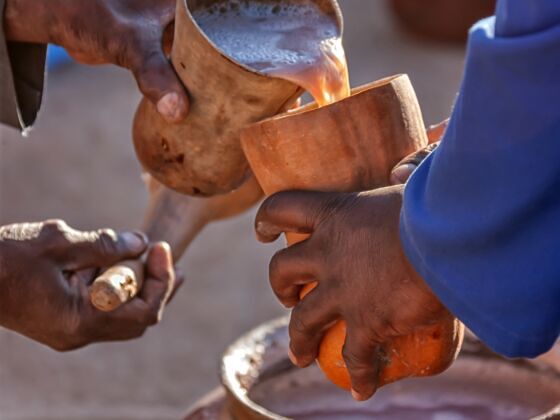We sat on a log doubling as a bench in a friend’s garden in Emerald Hill, Harare. I exuded the detectably false confidence of any underage drinker: that suspicious overeagerness to be cool that manifests itself as an awkward silence flecked with blurts of mistimed, unfunny interjections. In the rest of the circle were the silhouettes of my seniors, backlit by the dying orange floodlights of a tennis court.

Chibuku traditionally comes in a small barrel the size of a newborn baby, and it was being passed around like the arch-nemesis of a talking stone. Dragging its consumers down into an abyss of nonsensical dialogue.
When it got to me, I wrapped my hands around the plastic surface and customarily shook it, hearing the thud of the thick, chunky liquid hit the sides of the container like a cement mixer. I unscrewed the blue cap and put the uncomfortably large hole to my lips. The first time Chibuku hits your tongue and palette and sinks roughly down your throat, it can give you a kind of déjà vu of puking in rewind.
That said, I enjoyed my first experience with Chibuku. It may not appeal to most, but I’ve always liked a sour taste so that didn’t bother me. I’m not too keen on the porridge-like texture of the drink, though, and I wasn’t sure if I should chew the bits stuck between my teeth or wipe them on my sleeve.
Chibuku is Southern Africa’s equivalent to cheap cider in the UK, or Spanish sangria concocted by mad street scientists with cheap wine and knock-off Sprite. Produced en masse by breweries throughout the region, its roots are in village-prepared homebrews consisting of maize, water, sorghum, yeast, and enzymes. After adding yeast to the gruel-like maize concoction, the brew is left to sit and ferment (the longer the better, or more potent). The sorghum adds a grainy scent, and the vinegary aroma is immediately detectable in the fermented blend.
Holding a Chibuku and preparing to accommodate an opaque mouthful of it has an element of playing lucky dip…or Russian roulette. I remember staring down into the pitch-black barrel, unable to make out the contents and bracing myself for the taste of gone-off milk and oatmeal. There’s also the underlying fear of coming across something more untoward than a lump of corn. Zimbabwe has a fully functioning rumour mill, and tales of what undesirable things could be found at the bottom of your Chibuku are always readily available from your drinking buddies.
It’s affectionately known as “Scud,” named after the missiles developed in the Soviet Union, because of the brand’s ability to obliterate the patrons of any bottle store. Chibuku has been a household name in the region (Malawi, Zambia, Botswana, and Zimbabwe) for quite some time and is associated with being the everyman drink: cheap, well-liked, and safe. I say this because the local boozer has had to be careful about what they choose to consume. Two drinks in particular have built up infamous reputations in Zimbabwe. These are Kachasu (more prevalent in the ’90s) and more recently, with a ring of finality to it, the ominously named Zed. On the lighter side, Zed has been known to woo its fans into roaming the Monday streets naked whilst, on the darker side, both drinks have, and continue to, claim the lives of too many people who get hooked on their cheap and extremely dangerous makeup.
Zed comes in illegally over the border from Mozambique and can be bought from your local dodgy black market dealer. It claims to contain 40% alcohol, but it’s widely believed that the true content hovers well above 60%. It’s a clear spirit that’s like a halfway house between vodka and petrol and has been given the names “Zimbabwe Emergency Drink” and “Zimbabwe Early Death.”
So, if Chibuku leaves a thick greasy film after the first sour gulp, I think it’s safe to say it’s earned its place as the tonic of the people. Now with its new flashy white carton it may even bring in a new breed of drinker who feared the hefty, mysterious barrel of old.